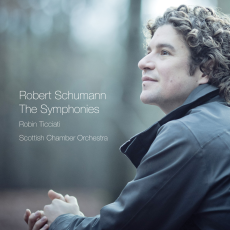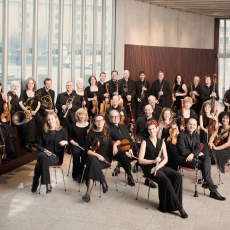Robin Ticciati & SCO - Schumann: The Symphonies - Herald Scotland
Every year without fail, and at this point of the year too, I'm asked the same questions.
What's the best thing you've heard this year? Which have been the best concerts? Who's improved? Who's gone off? Who's been most on form? What has been your most memorable event? How do you think such and such an orchestra's relationship with such and such a music director or chief conductor is developing? What trends do you see on the musical landscape? And so on, ad infinitum, as the year begins to draw to a close.
When you think of it, in a way it's the wrong time to be asking these questions. All the orchestras are bang in the middle of their winter seasons; in fact they're not even at the mid-point of concert seasons that began in early October and seem to be extending each year, way past Easter and very close to the start of the Perth Festival of the Arts, which is usually mid to late May.
In other words there's lots more Runnicles, Oundjian and Ticciati yet to come with their respective orchestras before we can have a big perspective on how they've all fared in the current concert season. None the less, I suppose there is a feeling to the ending of one year and the approach of another which suggests, though not as an imperative, some kind of reflection. And that came to mind again a week past Friday in the City Hall, where Christian Tetzlaff joined the SCO, in its last Glasgow concert of the year, for a rare and revealing performance of Schumann's Violin Concerto.
Now here's a trend if ever I saw one. Let's call it the rehabilitation of the orchestral music of Robert Schumann. Those of us of a certain generation grew up with a common prejudice about Schumann, whether we believed it or not: that he wasn't a very good orchestrator; that his orchestration was too thick.
In the revised version of his Second Symphony, which Schumann wrote in 1851, he did in fact make the symphony weightier, which only added fuel to the flames for critics of his orchestral technique. Even his great friend and supporter, Brahms, cast a dubious eye over this piece of work, writing much later, after Schumann's death, to Clara Schumann, saying: "I find it enchanting how the lovely work immediately appeared in charming, appropriate garb. Why did Schumann later drape it so heavily? His bad Dusseldorf orchestra may have duped him into doing that."
And when I was a kid, that's the way we tended to hear it. Direct comparisons with Brahms were drawn; Schumann lost every time. But that's a faulty comparison. There is a very different centre of gravity to Schumann's symphonic music. Its impulse is more poetic than the heavyweight, intellectual rigour of Brahms's symphonic music.
I'll not even mention the genius of cyclical integration that so characterises Schumann's symphonic music: just stick to the weight for now. Generations of musicologists and conductors now realise this and are activists in lightening the music, bringing out a wholly different impulse and balance in the music.
I recall Sir Roger Norrington, in a past interview, reiterating this thesis: that there is a sense of "playfulness" in Schumann's music that, along with the poetic core at the heart of the stuff, sets Schumann apart from Brahms and closer, if you wish to entertain such comparisons, to the ethos of Mendelssohn; but then let one go, too. My own feeling, which I've been banging on about for years, is that Schumann, in fact, doesn't fit into that neat line of succession, other than by a loose chronology. He is, in fact, unique: a man apart. And that is the mission which creates and informs this trend.
Norrington does it with a vengeance. And you can hear it all the way through Robin Ticciati's new and widely-acclaimed recording of the symphonies with the SCO.
There's another very significant and ongoing trend that has characterised this year for me, so we'll launch 2015's columns with that one next Saturday. A guid musical New Year to all.


